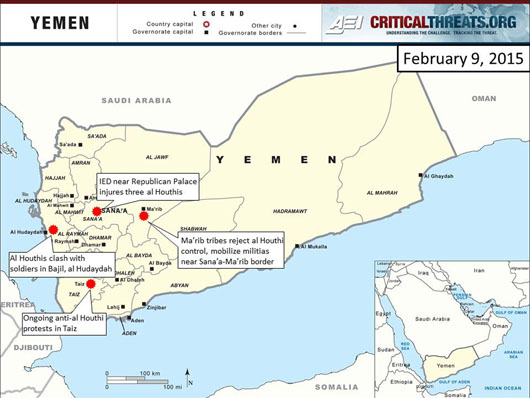Efforts to renew negotiations between Yemen’s political actors are likely to fail, and the al Houthis are pressing forward with their plan to form a new government. Continued opposition to the al Houthis will continue to destabilize Yemen, creating space for al Qaeda in the Arabian Peninsula (AQAP) to expand.
Yemen’s political parties rejected the al Houthis’ February 6 Constitutional Declaration. Yemen’s two main political parties, the General People’s Congress (GPC) and the Islah (Reform) Party, as well as the southern governorates of Lahij, Shabwah, and Aden, condemned the al Houthi power grab and plans for establishing a new government. The Gulf Cooperation Council (GCC) called the takeover a coup. UN Special Envoy to Yemen Jamal Benomar attempted to resume talks between al Houthis and political parties on February 9, but political factions are already withdrawing from negotiations. The al Houthis are unlikely to retract their declaration and make concessions to other political parties.
The al Houthis began forming a new government. The al Houthi Revolutionary Committee established a 17-member Supreme Security Council (SSC) led by former Minister of Defense Mahmoud al Subaihi on February 6. The SSC, which includes top military commanders, will oversee governance until the appointment of a presidential council. Yemen’s Ministry of Defense established a joint operations center to coordinate the efforts of the military, police, and al Houthi local militias.
The al Houthis may be planning an incursion into Ma’rib. Ahmed al Yafai, the commander of Yemen’s 3rd Military District, headquartered in Ma’rib, was called to Sana’a on February 7 to meet with military commanders. It is widely believed that al Houthis will attempt to enter Ma’rib to secure oil infrastructure, and the meeting may be an indicator that the planning process is progressing. Ma’rib tribes rejected the al Houthis’ Constitutional Declaration and stated they are ready to combat any incursion into their territory.
Violent unrest continues as anti-al Houthi sentiments deepen. Thousands of anti-al Houthi protesters marched in Sana’a, al Hudaydah, Ibb, and Taiz on February 7. The Sana’a protests turned violent: al Houthis used clubs to beat back protesters in Sana’a and an improvised explosive device planted near the Republican Palace wounded three al Houthi guards. Al Houthis also clashed with soldiers belonging to the 10th Brigade in Bajil, directly west of al Hudaydah Port. Three al Houthis and one soldier died in the fighting.
The U.S. insists it will continue with its counter-terrorism partnership in Yemen. Deputy State Department Spokesperson Marie Harf stated on February 6 that the U.S. condemns the unilateral declaration of power by the al Houthis and continues to recognize President Abdu Rabbu Mansour Hadi as the legitimate president of Yemen. The U.S. continues to call for Yemeni stakeholders to abide by the 2011 GCC initiative and the outcome of the National Dialogue Conference. White House spokesman Eric Schultz also asserted recent events in Yemen will not affect U.S. counter-terrorism efforts.
The continued political turmoil in Yemen threatens the U.S. counter-terrorism partnership, despite the al Houthis’ announcement of a political transition plan. AQAP will continue to capitalize on anti-al Houthi sentiments, especially in Ma’rib and al Bayda, to expand its presence.
← PREVIOUS |
NEXT → |

